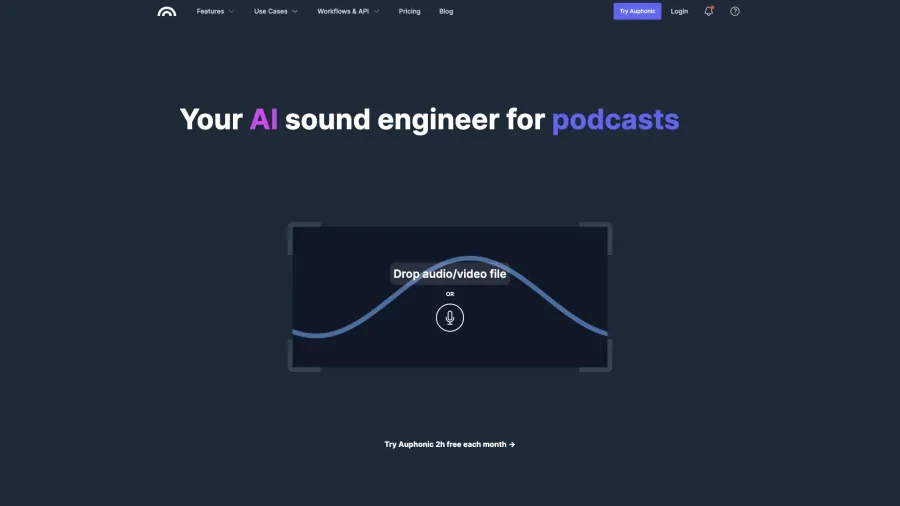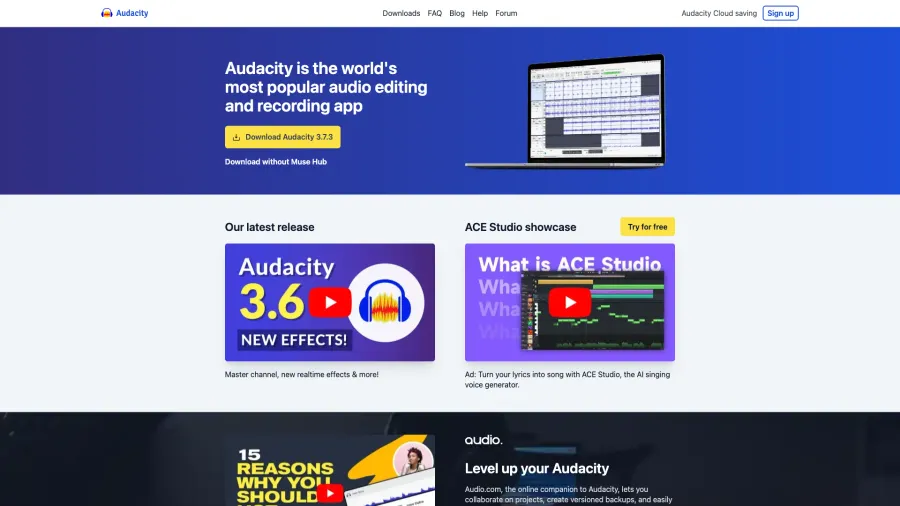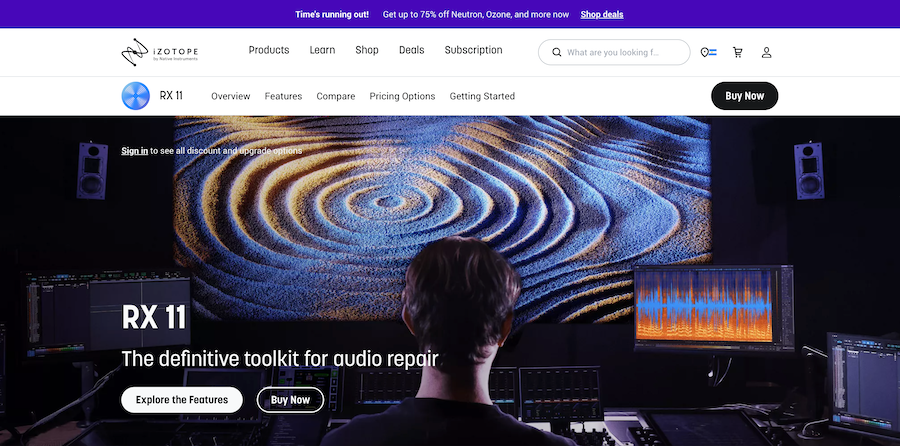- Home
- Audio Tools
- Audio Enhancement
- Auphonic


Auphonic
Automated Audio Post-Production & Leveling Service
Auphonic is an intelligent, cloud-based audio processing service that automates the technical aspects of audio post-production to create broadcast-ready content with minimal effort. Using sophisticated algorithms developed specifically for spoken-word content, Auphonic analyzes audio files and applies appropriate leveling, noise reduction, and normalization based on industry standards. The system automatically balances levels between different speakers, removes background noise, and ensures consistent loudness across episodes or between different programs. With both web interface and mobile app access, Auphonic allows content creators to achieve professional sound quality without extensive audio engineering knowledge or expensive equipment. The service offers flexible processing options through monthly subscriptions or pay-as-you-go credits, making professional audio post-production accessible to creators at all levels.
Ratings Breakdown
Key Features
Automatic loudness normalization
Adaptive leveling algorithms
Background noise reduction
Multitrack processing
Broadcast standard compliance
Multiple output format support
Audio restoration tools
Audio fingerprinting
Batch processing capability
Pros & Cons
Pros
Exceptional leveling quality
Simple, intuitive interface
Time-saving automation
Consistent results across episodes
Broadcast compliant outputs
Minimal technical knowledge required
API integration available
Production-ready audio with minimal effort
Cons
Subscription or credit-based pricing
Internet connection required
Limited granular control compared to DAWs
Processing time depends on server load
Some advanced features only in higher tiers
Free tier has limited processing minutes
Not designed for music mastering
What is Auphonic?
Auphonic is an automated audio post-production and processing service that uses advanced algorithms to transform raw recordings into broadcast-ready files with minimal user intervention. Founded in 2011 as a research project at the University of Graz in Austria, Auphonic has evolved into a professional cloud-based platform that addresses the most common technical challenges in spoken-word audio production. At its core, Auphonic applies intelligent signal processing to analyze audio characteristics and automatically implement appropriate corrections for issues like inconsistent volume levels, background noise, and overall sound quality. Unlike traditional audio editing software that requires manual adjustments and technical expertise, Auphonic's approach centers on smart presets and adaptive processing that can identify and address audio problems autonomously. The service particularly excels at loudness normalization—ensuring audio maintains consistent perceived volume throughout a recording and meets specific broadcast standards like EBU R128 or ATSC A/85. The platform functions primarily through a web interface where users upload audio files for processing, though dedicated mobile apps and API integration options provide flexibility for different workflows. While originally developed with podcasters in mind, Auphonic has become an essential tool for a wide range of content creators including broadcasters, audiobook producers, and video creators who need consistent, professional-quality audio without dedicating extensive time to technical audio engineering tasks.
Key Features
Auphonic offers a comprehensive suite of automated audio processing tools centered around intelligent analysis and adaptive algorithms. The platform's flagship capability is its loudness normalization and leveling technology, which analyzes audio to create consistent perceived volume throughout recordings and between episodes, automatically conforming to broadcast standards including EBU R128, ATSC A/85, and podcast-specific targets. Adaptive leveling algorithms balance volume differences between multiple speakers without manual adjustments, solving one of the most common problems in interview and conversation-based content. The intelligent noise and hum reduction automatically identifies and removes consistent background sounds like air conditioning, computer fans, and electrical interference without the artificial "underwater" effect common in less sophisticated noise reduction. High-pass filtering eliminates low-frequency rumble and unwanted bass content that can compromise clarity, particularly important for spoken-word intelligibility. Audio restoration tools automatically detect and repair issues like clipping, distortion, and sudden level spikes. Multitrack processing capabilities allow separate treatment of different audio sources (like host and guest tracks) before combining them into a final mix. The audio fingerprinting technology can detect music usage for proper reporting and licensing documentation. Format conversion generates multiple output files simultaneously, creating high-quality masters alongside compressed versions for distribution. Global loudness statistics and audio analysis provide detailed reports with visualizations showing before and after processing states. Batch processing allows multiple files to be queued and processed sequentially, saving significant time for producers with large content volumes. The cloud-based approach means processing occurs on Auphonic's servers rather than the user's computer, making high-quality audio production possible even on modest hardware. The system also supports metadata embedding, chapter markers, and integration with major hosting platforms for streamlined publishing workflows.
Who Should Use Auphonic?
Auphonic serves a diverse user base united by the need for professional audio quality without extensive manual processing. Podcasters, from beginners to professionals, benefit significantly from the platform's ability to transform inconsistent recordings into broadcast-ready files with consistent loudness and improved clarity. Content creators developing instructional videos, online courses, or YouTube content find value in quickly enhancing voice recordings to professional standards without mastering complex audio engineering concepts. Radio producers and broadcasters utilize Auphonic to ensure compliance with industry loudness standards while maintaining consistent sound across different segments and shows. Audiobook narrators and producers leverage the platform to create uniform quality across lengthy narrations that may have been recorded across multiple sessions. Corporate communications teams developing internal training materials, presentations, and company podcasts appreciate the ability to produce professional-sounding content without dedicated audio staff. Field journalists and documentary producers use Auphonic to enhance recordings made in challenging environments. Educational institutions creating lecture recordings, distance learning materials, and student projects benefit from the straightforward workflow and consistent results. Event organizers recording conferences, panels, and presentations can quickly process multiple sessions for distribution. Small production companies with limited audio engineering resources find Auphonic valuable for maintaining professional quality across diverse projects. While professional audio engineers might still prefer manual processing for specialized music production, many incorporate Auphonic as a time-saving first pass for spoken-word content or use it as a quality control check against established loudness standards. The service is particularly valuable for content creators who need consistent, professional audio quality but cannot justify dedicated audio engineering time for routine productions.
Pricing
Auphonic offers a flexible pricing structure designed to accommodate different usage levels from occasional creators to full-time production houses. The platform provides a free tier that includes 2 hours of audio processing per month, making it suitable for hobby podcasters or those testing the service. For more active creators, monthly subscription plans start at approximately $11 per month for 9 hours of processing, with additional tiers at $24 (20 hours), $49 (50 hours), and $99 (100 hours) per month. All subscription plans include access to the full feature set with no functional restrictions. For users with irregular processing needs or those who prefer pay-as-you-go pricing, Auphonic offers credit packages starting from $9 for 3 hours of processing, with better rates for larger packages up to 100 hours for $89. These credits never expire, providing flexibility for seasonal or project-based production schedules. Educational institutions can access special pricing with substantial discounts for classroom and institutional use. Enterprise customers with high-volume needs can contact Auphonic for custom pricing and dedicated support options. The pricing is based on the duration of processed audio rather than file size or specific features used, making costs predictable and easy to budget. When compared to the time cost of manual audio engineering or hiring professional services, Auphonic represents significant value for content creators who regularly produce spoken-word audio. The company occasionally offers promotional discounts, particularly for annual subscription commitments. All plans include multi-format output generation, allowing users to create various file formats from a single processing job without additional charges. For developers and organizations needing programmatic access, API usage is included in paid plans with the same hourly processing allocations as the web interface.
User Experience
Users consistently highlight Auphonic's balance of sophisticated processing capabilities and operational simplicity. The web interface presents a streamlined workflow that guides users through the upload, configuration, and processing stages with clear, logically organized options. For most standard spoken-word content, the default presets produce excellent results without any parameter adjustments, making professional-quality audio accessible to those without technical audio knowledge. More advanced users appreciate the ability to customize processing settings, create production presets for consistent treatment across multiple episodes, and fine-tune parameters for specific content types. The results receive particularly high praise, with users noting that Auphonic frequently achieves better and more natural-sounding loudness normalization than manual processing attempts, especially for maintaining consistent levels between different speakers. The cloud-based processing approach means uploads and downloads constitute the primary wait times, with actual processing typically completing quickly depending on file length and server load. Mobile apps for iOS and Android provide on-the-go processing capabilities with a simplified interface suitable for field production and quick adjustments. Integration options with podcasting platforms, content management systems, and digital audio workstations through the API allow Auphonic to fit seamlessly into established production workflows. The detailed processing reports provide valuable insights into the before and after states of audio files, helping users learn about their recording practices and potential improvements. While some users note that the most comprehensive noise reduction and restoration might still require specialized tools like iZotope RX for extreme cases, Auphonic's processing is more than sufficient for the vast majority of common audio issues. The subscription and credit-based pricing models receive generally positive feedback for their flexibility, though some users with very low volume needs mention they would prefer smaller incremental options. Regular platform updates continue to refine the algorithms and add capabilities based on user feedback and emerging audio standards.
Bottom Line
Auphonic represents a significant advancement in audio post-production by effectively automating technical processes that traditionally required specialized knowledge and manual intervention. The platform's strength lies in delivering sophisticated audio processing through an exceptionally user-friendly interface that produces professional results regardless of the user's technical expertise. By focusing specifically on the challenges of spoken-word content rather than attempting to serve all audio production needs, Auphonic provides targeted solutions that consistently outperform general-purpose tools for podcast, broadcast, and voice-based content. The adaptive algorithms demonstrate remarkable intelligence in identifying and addressing audio issues without creating artifacts or unnatural sound quality that often plague automated processing. While it won't replace comprehensive digital audio workstations for complex music production or specialized sound design, it excels at its core purpose of transforming raw recordings into broadcast-ready content with minimal effort. The value proposition is particularly compelling for regular content producers who need consistent quality across multiple episodes or projects. As podcast and voice content production continues to expand beyond professional studios to creators working in diverse environments, tools like Auphonic that bridge the quality gap between amateur and professional production will remain increasingly valuable for maintaining audience engagement through technical excellence.
Share with others
Was this content useful to you?
Found an error?
We strive for accuracy. If you've spotted incorrect information about this tool, please let us know.
Report ErrorMore from this Category

Adobe Podcast
AI-Powered Audio Recording & Enhancement Platform
A web-based audio recording and enhancement tool that uses artificial intelligence to improve voice recordings, remove background noise, and create studio-quality sound with minimal effort.

Audacity
Free, Open-Source Audio Editing Software
A powerful, cross-platform audio recording and editing application that offers comprehensive tools for sound manipulation, multi-track editing, and audio production completely free of charge.

iZotope RX
Professional Audio Repair & Restoration Suite
An industry-standard audio repair and enhancement toolkit that offers sophisticated algorithms for fixing and polishing problematic audio recordings with unparalleled precision and quality.



